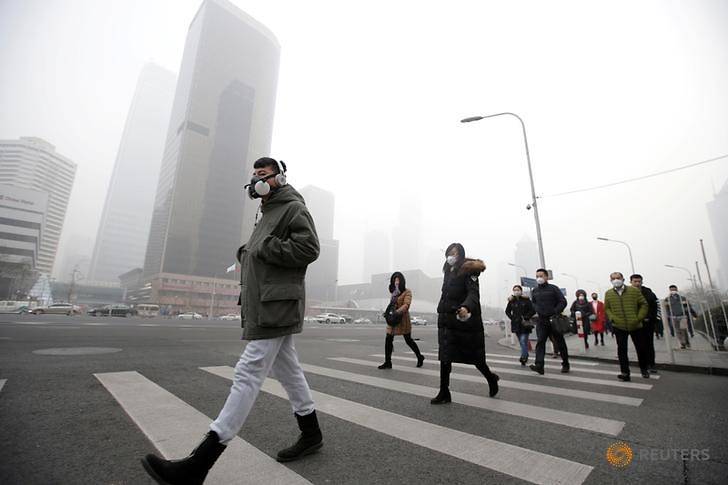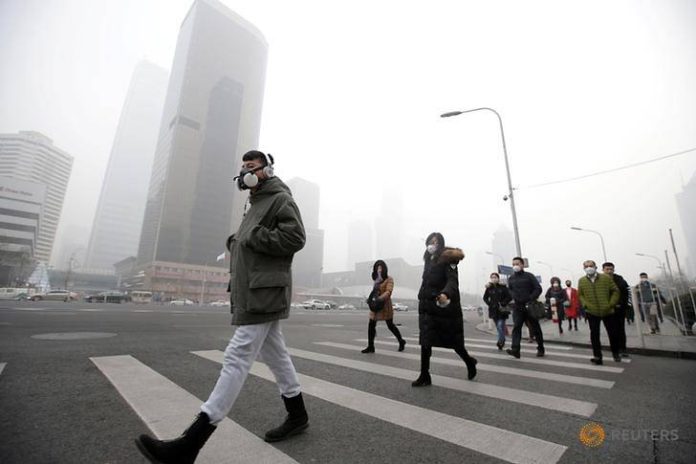LONDON: Everybody loves a good productivity hack. Clever tips on getting more from each working hour are a well-loved genre, from complicated to-do lists and tomato-shaped timers, to advice on mindfulness and the merits of going barefoot.
That’s not to mention the supposed gains in creativity and concentration from surrounding your desk with the colours red and blue.
But there is one action that seldom appears on these lists, despite a growing volume of evidence to suggest it has a pronounced effect on both physical and mental productivity: Working in a location with good air quality.
IMPACT ON COGNITION AND WORK
Particulates — especially fine and ultrafine particles below 2.5 micrometres in diameter — are widely recognised as a long-term health issue, even if many people do not appreciate the scale of the harm or how extensive the evidence has become.
Inhaling particulates leads to a higher risk of dementia and causes one-third of all deaths from stroke, lung cancer and heart disease, according to the World Health Organisation.
Recent research, however, suggests air pollution is not just a long-term health issue that causes unpleasant diseases as you age.
READ: Haze hits unhealthy levels across Singapore on Wednesday
READ: All schools in Kuala Lumpur close as haze worsens in parts of Malaysia
It also stunts child development and appears to have an instantaneous effect on productivity: You become slower and dumber while breathing polluted air. This should have a profound effect on attitudes to air quality.
Humans are notoriously good at discounting long-term health risks from cigarettes and alcohol. But to have your cognition impaired right here, right now, as you try to work or study is something else.

A man wearing a respiratory protection mask walks toward an office building during the smog after a red alert was issued for heavy air pollution in Beijing’s central business district, China, December 21, 2016. (Photo: REUTERS/Jason Lee/Files)
The evidence increasingly suggests that particulates do not just penetrate the heart and lungs but also the brain.
The health impact should be enough to motivate action. But if confirmed, these effects also change the economics. Ill-health at the end of life subtract from the sum of human health and happiness, but damage to young brains suggests a direct, accumulating effect on productivity and human capital. Tackling particulates, in other words, might raise not just output but its growth rate.
IMMEDIATE EFFECTS ON SCHOOL PERFORMANCE AND PRODUCTIVITY
The immediate, on-the-day effects of air pollution can be surprisingly large. The economists Avraham Ebenstein, Victor Lavy and Sefi Roth show that a modest increase in particulates on the day of an Israeli student’s high school exams is associated with a significant decline in exam results.
These exams shape a student’s life career so that brief exposure to air pollution has lasting consequences, leading to an average of 0.15 fewer years of university education and ultimately US$30 less in monthly salary.
Every child has to take the exams and the date is fixed, so richer students cannot dodge the pollution and the authors can control for factors such as school quality.
Consider the extremes parents will go to improve their child’s exam results or get them into a better university. Yet their life chances can be blighted by a single day of air pollution.
A student and his father wear masks outside a public school, as classes in over 400 Bangkok schools have been cancelled due to worsening air pollution, in Bangkok, Thailand, Jan 30, 2019. (File photo: REUTERS/Athit Perawongmetha_
Another recent study by Tom Chang, Joshua Zivin, Tal Gross and Matthew Neidell looks at call centre staff working for the same company in different Chinese cities.
On polluted days, productivity fell by 5 to 6 per cent, and the effect was evident at air pollution levels often found in Europe and the US. Again, consider what else companies will do for a 5 to 6 per cent gain in productivity.
THE IMPACT ON PHYSICAL LABOUR AND CHILD DEVELOPMENT
The effects on physical labour are less surprising but still striking. There are studies showing lower productivity for citrus pickers exposed to higher ozone levels.
There are studies showing that German professional footballers — who cannot change the date or venue for a fixture — make fewer passes on days with greater air pollution.
Then there are the horrible effects found in many studies of child development. One shows that living in an area of the US with high carbon monoxide pollution does more harm to a baby in utero than the mother smoking 10 cigarettes a day.
A study of almost 3,000 schoolchildren in Barcelona found that kids exposed to more air pollution suffered slower cognitive development. This affects the poorest most of all, but nobody who lives in a city is safe.
TACKLE AIR POLLUTION FIRST
In recent years, climate change has come to dominate environmental policy — for good reason. Yet that is a challenge for which humans are psychologically ill-equipped.
There are essentially no gains from stopping climate change, only losses averted, and the problem is totally resistant to individual action. Nothing a single person does makes any difference.
READ: Commentary: Climate change in Singapore and what the future brings
READ: Commentary: Climate action is our generation’s 1965
Tackling air pollution, on the other hand, benefits everybody and is amenable to action at every scale. What is more, it appears the benefits will be felt straight away.
Individuals can install filters to improve indoor air quality. Small groups can monitor and publicise local air quality. Once particulates start to affect property prices, watch how seriously people take them.
Cities and nations can regulate polluting vehicles and power generators. Since most particulate emissions come from the same fossil fuel sources as greenhouse gases, it is also a policy to tackle climate change, framed in a way more likely to find public favour.
If there was a pill available that improved exam results, reduced your chances of dementia and made you more productive at work, it would sell by the billion.
Since reducing air pollution is such a pill, why not take it?





